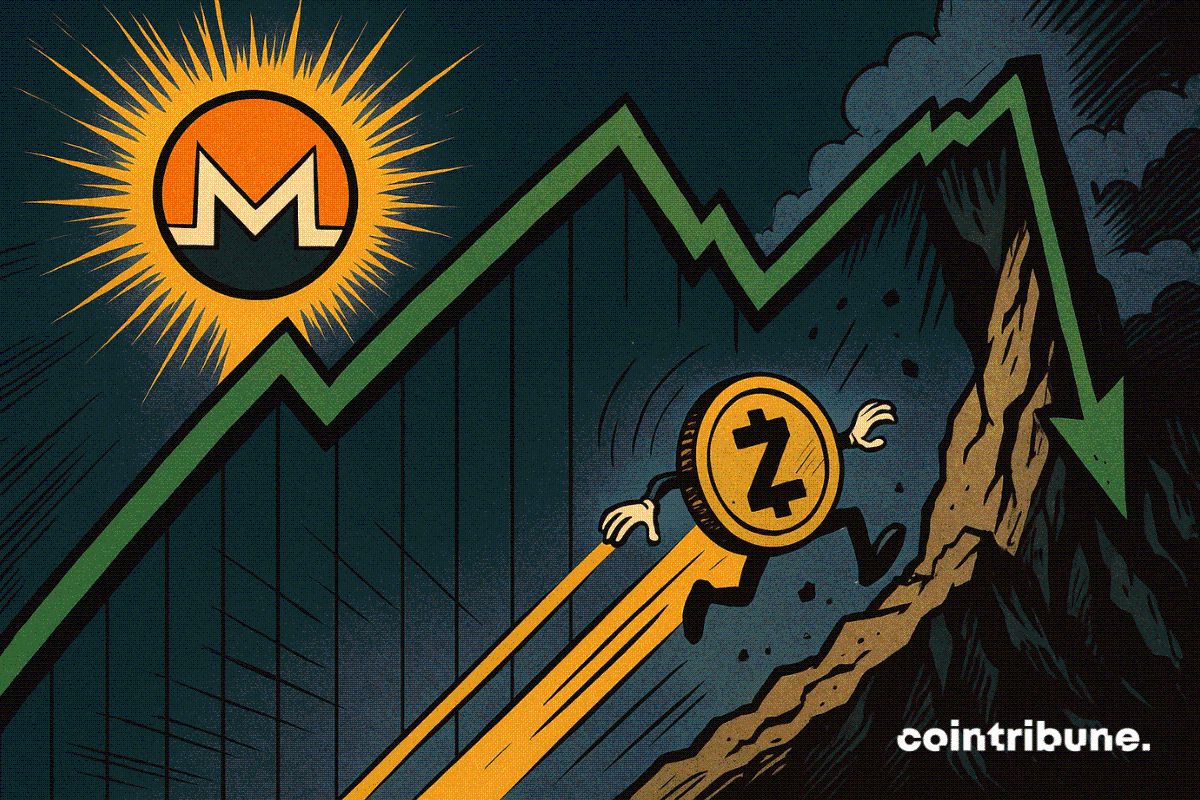Bitcoin News Update: MSCI Regulation Ignites Tension Between Bitcoin and Major Traditional Financial Institutions
- MSCI's proposed rule to exclude firms with over 50% crypto assets risks triggering $8.8B in forced Bitcoin sell-offs from index-tracking funds by 2026. - JPMorgan's analysis highlights existential threats for crypto-focused companies like Strategy (MSTR), which could face $2.8B in passive outflows alone. - Critics accuse MSCI and JPMorgan of bias, citing the bank's anti-crypto stance and the "binary cliff effect" of the 50% threshold destabilizing market eligibility. - The debate reflects a clash between
MSCI’s Proposed Crypto Exclusion Rule Sparks Industry Turmoil
Bitcoin-focused companies are facing uncertainty as MSCI considers a new policy that would exclude firms holding more than half their assets in digital currencies. This proposal, slated for implementation in February 2026, has ignited heated debate—particularly with JPMorgan playing a central role in the discussion.
If enacted, the rule could reclassify corporate Bitcoin holdings as investment funds, potentially forcing index-tracking funds to sell off billions in assets. JPMorgan’s research suggests that if other major index providers like Russell and FTSE Russell follow suit, outflows could reach as much as $8.8 billion. This scenario raises serious liquidity concerns for companies such as Strategy (MSTR), which currently holds a majority of its assets in Bitcoin.
This controversy highlights the ongoing friction between established financial institutions and the cryptocurrency sector. MSCI maintains that its policy is intended to ensure its indices represent active operating companies rather than passive investment vehicles. However, prominent Bitcoin supporters—including Grant Cardone and Jack Mallers—have accused MSCI and JPMorgan of bias, referencing the bank’s controversial history and its perceived opposition to cryptocurrencies. These accusations have fueled social media campaigns urging investors to boycott JPMorgan, with some moving their funds to competitors like Wells Fargo.
JPMorgan’s involvement in forecasting the potential fallout has drawn additional attention. The bank’s analysis indicates that removing Strategy from MSCI’s Global Investable Market Indexes alone could trigger $2.8 billion in passive outflows, with even greater effects if other index providers adopt similar standards.

Smaller companies with crypto treasuries may also be forced to liquidate digital assets to meet financial requirements if their stock prices fall, increasing pressure on the sector.
Wider Implications for Corporate Bitcoin Holders
The debate has extended into the broader corporate world, where over 190 publicly traded U.S. companies collectively hold approximately $115 billion in Bitcoin as part of their treasury strategies. For Bitcoin itself, the impact of the rule could be neutral or even positive if inflows into ETFs offset corporate sell-offs. BlackRock’s IBIT, for example, has already attracted over $100 billion, providing a regulated alternative for Bitcoin exposure. However, for companies like Strategy, the consequences could be severe. Founder Michael Saylor describes the company as a “Bitcoin-backed structured finance company,” rejecting the notion that it operates as a passive fund. Smaller firms, lacking the same flexibility, are already experiencing forced asset sales as their net asset values decline.
Criticism and Concerns Over Benchmark Integrity
Bitcoin Magazine has criticized MSCI’s proposal, arguing that it undermines the neutrality of market benchmarks and could politicize the process of index construction. The publication also notes that MSCI itself holds $3.7 billion in intangible assets—arguably less transparent and liquid than Bitcoin—yet faces no similar restrictions. Critics further warn that the 50% asset threshold could create a “cliff effect,” where fluctuations in Bitcoin’s price might cause companies to repeatedly fall in and out of index eligibility, potentially destabilizing markets.
The Road Ahead for Institutional Bitcoin Access
The outcome of MSCI’s consultation, which closes on December 31, will have significant implications for how institutional investors gain exposure to Bitcoin. Should the rule be adopted, it may accelerate a shift from corporate Bitcoin treasuries to ETF-based holdings, increasing the concentration of Bitcoin in regulated investment vehicles. The crypto community remains divided: some see the proposal as a step toward greater financial stability, while others view it as an attempt to limit innovative corporate strategies.
Disclaimer: The content of this article solely reflects the author's opinion and does not represent the platform in any capacity. This article is not intended to serve as a reference for making investment decisions.
You may also like
Ethereum Updates: BitMine's Ethereum Acquisition Echoes MicroStrategy's Bitcoin Strategy, Targets $3,600 Surge
- Ethereum fluctuates between $2,600–$3,000 as analysts monitor $2,800 support level for recovery signals. - BitMine Immersion Technologies accumulates 3% of Ethereum supply (3.63M ETH, $11.2B value), mirroring MicroStrategy's Bitcoin strategy. - Spot ETF inflows ($230.9M) and institutional demand, coupled with Apparent Demand metric hitting 26-month highs, suggest potential $3,600 rally if $2,800 support holds. - BitMine's $7.4B market cap and 51.5 current ratio highlight its unique financial position, wi

Bitcoin Updates: The Cryptocurrency’s Eco-Friendly Transformation—How Artificial Intelligence, Cloud Technology, and Renewable Energy Drive Responsible Expansion
- Crypto market shifts toward sustainability via AI, cloud, and blockchain, with Alibaba and Bybit leading green tech integration. - Bitcoin miners like CleanSpark leverage renewable energy and low-cost remote locations, while BI DeFi's $180M XRP inflows highlight institutional eco-friendly interest. - CoinShares pivots to diversified crypto ETFs amid regulatory scrutiny, mirroring industry trends toward high-margin sustainable products. - Crypto donations exceed $3M for Hong Kong fire relief, showcasing a

Monero Gains, Zcash Struggles In Privacy Coin Shake-up

Is Pump.fun (PUMP) Poised for a Bullish Move? This Fractal Setup Suggest So!
